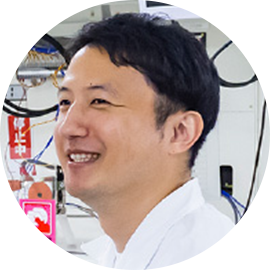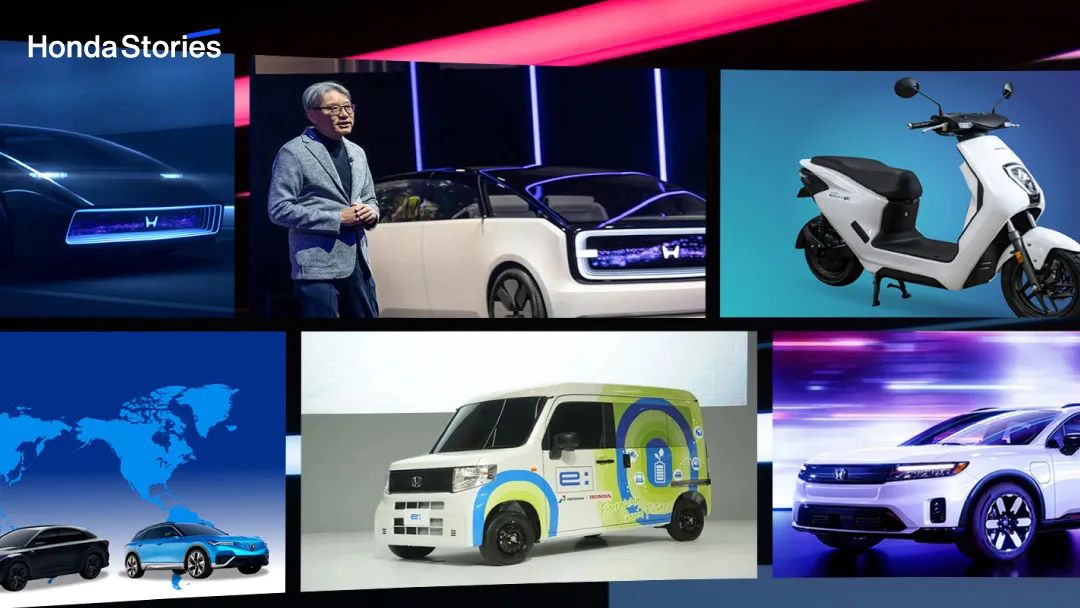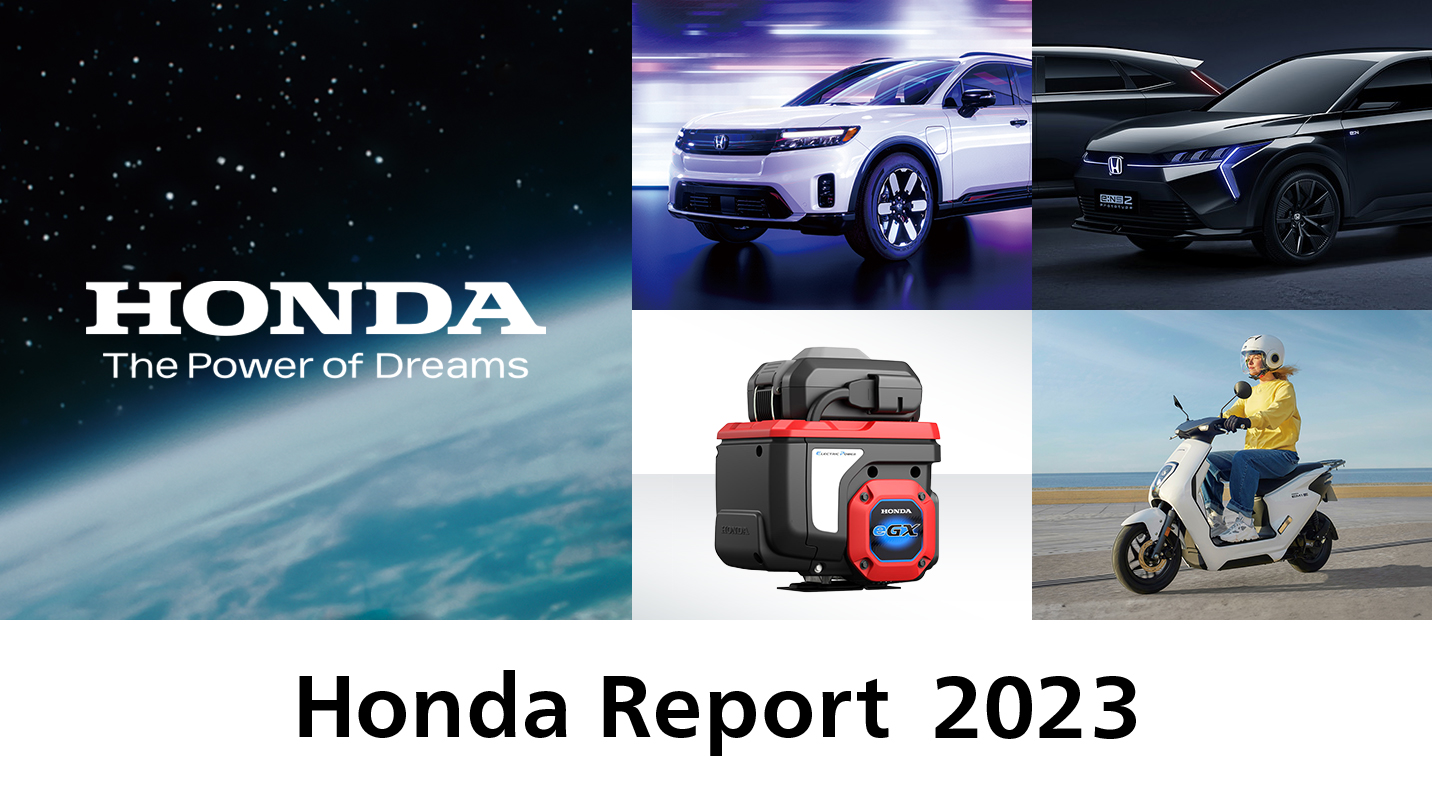Since his university days, Mochizuki has focused on energy issues and has been researching fuel cells, which generate energy through a chemical reaction between hydrogen and oxygen. After joining Honda, he has been conducting research and development on hydrogen fuel cell “FC stack”. How can he make his childhood dream of “improving the global environment” come true through Honda's products? We also talked about his thoughts on fuel cells, the rewards of working at Honda, and his future prospects.

Department 3
Energy Unit Research and Development Division
Innovative Research Excellence, Power Unit & Energy Honda R&D Co., Ltd.
View More
Close
Takashi Mochizuki
Read More
Dreams of improving the global environment come true through Honda products
First of all, Mr. Mochizuki, tell us why you joined Honda.
What kind of dreams did you have when you joined the company?

I have been interested in environmental issues since I was an elementary school student and wanted to improve the global environment. I was strongly aware of the importance of solving energy issues to prevent global warming, so at university I became interested in fuel cells, which generate energy through a chemical reaction between hydrogen and oxygen, and conducted research on them. Since I joined the company, it has been my dream to utilize my research experience to help reduce environmental impact through Honda products.

You mentioned that you are researching and developing the hydrogen fuel cell "FC stack". What kind of mission does the "Innovative Research Excellence, Power Unit & Energy” to which you belong have?

First of all, in order to achieve Honda's goal of “realizing carbon neutrality in 2050”, it is necessary to popularize not only electric vehicles but also fuel cell vehicles.
However, for Honda to survive in the future, it is important not only to achieve its goals but also to turn new technologies into products. When selling products, it is also necessary to keep costs down. Therefore, when proceeding with a project, we are conscious of both “evolution through development” and “cost control”.
In addition to the mobility products we have produced so far, I think our important mission is to increase customer satisfaction by creating new products, including applications that utilize fuel cells such as stationary storage batteries.

Don't stop with just “new technology”
From your viewpoint, what do you think is the appeal of Honda?

I think the biggest appeal is that you are given the freedom to do what you want. Even young associates can succeed if they are highly motivated, and Honda's unique culture is an environment in which associates can speak openly regardless of the hierarchy. Additionally, there are many unique associates who are deeply knowledgeable in their specialized fields, which inspires us on a daily basis. Honda's ability to take in the individuality and opinions of each associate and integrate them into a single product is another characteristic and appeal of Honda.
You think the individuality of our associates is the source of power for Honda, don't you? When do you feel fulfilled in your work?

When new results come out during research, whether it's good or bad, I get excited (laughter). As we continue to conduct research and tests, we often come across unexpected results. Even if the results are not very good for a project, they can be technically interesting, and as an engineer, I find the time spent discussing failures among members very meaningful and fun.

Then, on the other hand, are there any challenges or obstacles in pursuing research and development?

First, we need to create products that meet market needs. In order for customers to choose us, we need to meet a wide range of requirements, including not only product performance but also usability and legal compliance. In order to decide what kind of fuel cells Honda should create, we are collaborating with members stationed overseas to gather information.
There are also concerns about whether the fuel cells currently being developed will be widely used in society. When I talk to people from hydrogen infrastructure companies, I often hear the opinion “as long as there is no need, we cannot invest in infrastructure”. Therefore, in order to achieve social implementation of fuel cells, we feel it is necessary to simultaneously develop hydrogen infrastructure and develop fuel cell products. To achieve this, we must work together across the industry. We are also thinking about “what Honda can do” while keeping a close eye on trends in the latest technology in hydrogen production, storage, and supply.
Leading the world in the fuel cell field
What do you think about environmental issues through your research and development at Honda?

Honda plays an important role in contributing to reducing the world's environmental impact by developing new technologies, incorporating them into products, and disseminating them. My current job, in which my research becomes a product and contributes to improving the global environment, is extremely meaningful and deeply moving for me, as I have been aware of environmental issues since I was in elementary school.
In addition to reducing environmental impact, the benefits of using fuel cells include being an “energy carrier” that can efficiently store and transport hydrogen. For example, if surplus electricity generated at night is converted into hydrogen, it can be stored. I think this will be a very useful source of energy, especially for countries like Japan that lack primary energy resources such as oil. We believe that we can play a major role in this area of energy management as well.
Nowadays, fuel cells are used in a variety of places, but when I was doing research at university, they were not widely used. I'm really happy to be able to do research in the automobile industry, which is now essential to many people's lives. It has been my dream since I joined the company to “use the research I conduct to help people's lives”, so I would like to continue contributing to reducing environmental impact through Honda's products.
Seeing something you've been working on for a long time come to fruition is something that can't be replaced by anything, don't you think? Finally, tell us your vision for the future.

I have been researching fuel cells since my university days, and my future vision is to create hydrogen fuel cells that are unique to Honda, using materials and parts that other companies do not use. It's important to develop products that are well-balanced in all aspects, but I think that in order to make customers say “We want Honda 's fuel cells”, there has to be something unique about them. Among the projects I'm currently participating in, I would like to explore the aspects that contributes to “Honda’s uniqueness” and utilize them in our products.
Honda needs to continue to be a company that leads the world. To that end, we would like to aim to be number one in the world in the field of fuel cells, which are essential when considering the future of the earth.

Original article issued on October 9, 2023
<Related Articles>




![[Infographic] Understanding Honda's Hydrogen Business in Five Minutes -The Challenge to Expand Hydrogen Utilization Toward Carbon Neutrality-](/content/dam/site/global-en/stories/cq_img/064/social.webp)







When I was in university, I was researching fuel cells, and there was a Honda associate working in the research lab I belonged to. I was impressed by how enthusiastically and happily he talked about fuel cell research and his work at Honda. The reason I joined the company was because I was impressed by the fact that “Honda is a company where you can work so freely and happily”.